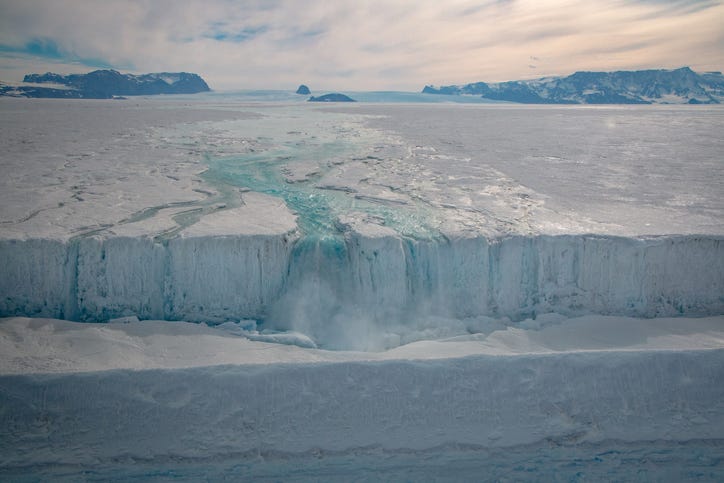
A new study is warning that the oceans could experience a catastrophic sea level rise if Antarctic ice continues to rapidly melt away as temperatures soar.
The study, published in Nature Geoscience, contains the first direct evidence of rapid ice loss in the West Antarctic Ice Sheet, according to the University of Cambridge and the British Antarctic Survey.
The study indicates that the ice sheet shrunk suddenly and dramatically at the end of the Last Ice Age, around 8,000 years ago.
Scientists are worried that today's rising temperatures might destabilize parts of the West Antarctic Ice Sheet in the future, potentially passing a tipping point and inducing a runaway collapse, which would trigger catastrophic sea level rise and lead to flooded coastal cities worldwide.
"We now have direct evidence that this ice sheet suffered rapid ice loss in the past," Professor Eric Wolff, senior author of the study, said in a statement. "This scenario isn't something that exists only in our model predictions and it could happen again if parts of this ice sheet become unstable."
The Antarctic ice sheets contain enough freshwater to raise global sea levels by around 187 feet, according to the study. Model predictions suggest that a large part of the West Antarctic Ice Sheet could disappear in the next few centuries, causing sea levels to rise.
"We wanted to know what happened to the West Antarctic Ice Sheet at the end of the Last Ice Age, when temperatures on Earth were rising, albeit at a slower rate than current anthropogenic warming," said co-author Dr. Isobel Rowell. "Using ice cores we can go back to that time and estimate the ice sheet's thickness and extent."
For the study, the researchers drilled a 2,135-foot-long ice core from the Skytrain Ice Rise, a mound of ice at the edge of the ice sheet near the point where grounded ice flows into the floating Ronne Ice Shelf. An analysis revealed that the ice thinned rapidly 8,000 years ago -- and once it started melting, it "shrunk really fast," according to the study.
"We already knew from models that the ice thinned around this time, but the date of this was uncertain," said Rowell. Ice sheet models placed the retreat anywhere between 12,000 and 5,000 years ago and couldn't say how quickly it happened. This study provides a "very precisely dated observation of that retreat," Rowell added.
The researchers say it is now "crucial" to determine whether a sustained rise in temperatures could destabilize the ice and cause it to start retreating again.
